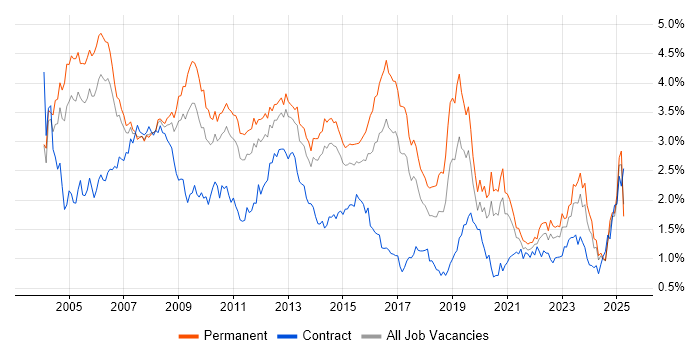Support Analyst
England > Yorkshire
The median Support Analyst salary in Yorkshire is £27,750 per year, according to job vacancies posted during the 6 months leading to 3 March 2026.
The table below compares current salary benchmarking and summary statistics with the previous two years.
| 6 months to 3 Mar 2026 |
Same period 2025 | Same period 2024 | |
|---|---|---|---|
| Rank | 92 | 101 | 106 |
| Rank change year-on-year | +9 | +5 | +95 |
| Permanent jobs requiring a Support Analyst | 91 | 43 | 99 |
| As % of all permanent jobs in Yorkshire | 2.12% | 1.81% | 2.10% |
| As % of the Job Titles category | 2.29% | 1.89% | 2.19% |
| Number of salaries quoted | 63 | 33 | 78 |
| 10th Percentile | - | £24,200 | £24,000 |
| 25th Percentile | £24,500 | £26,750 | £27,938 |
| Median annual salary (50th Percentile) | £27,750 | £35,000 | £33,250 |
| Median % change year-on-year | -20.71% | +5.26% | +12.71% |
| 75th Percentile | £35,000 | £43,750 | £43,750 |
| 90th Percentile | £39,560 | £47,500 | £47,000 |
| England median annual salary | £33,750 | £40,000 | £36,500 |
| % change year-on-year | -15.63% | +9.59% | +8.96% |
All Permanent IT Job Roles
Yorkshire
For comparison with the information above, the following table provides summary statistics for all permanent IT job vacancies in Yorkshire. Most job vacancies include a discernible job title that can be normalized. As such, the figures in the second row provide an indication of the number of permanent jobs in our overall sample.
| Permanent vacancies in Yorkshire with a recognized job title | 3,975 | 2,271 | 4,518 |
| % of permanent jobs with a recognized job title | 92.51% | 95.78% | 96.05% |
| Number of salaries quoted | 2,473 | 1,041 | 3,640 |
| 10th Percentile | £28,000 | £28,000 | £27,000 |
| 25th Percentile | £31,250 | £38,000 | £35,250 |
| Median annual salary (50th Percentile) | £48,945 | £50,000 | £50,000 |
| Median % change year-on-year | -2.11% | - | -8.90% |
| 75th Percentile | £66,250 | £73,750 | £66,250 |
| 90th Percentile | £82,500 | £90,000 | £82,500 |
| England median annual salary | £55,000 | £60,000 | £55,000 |
| % change year-on-year | -8.33% | +9.09% | -9.84% |
Support Analyst
Job Vacancy Trend in Yorkshire
Historical trend showing the proportion of permanent IT job postings featuring 'Support Analyst' in the job title relative to all permanent IT jobs advertised in Yorkshire.

Support Analyst
Salary Trend in Yorkshire
Salary distribution trend for Support Analyst job vacancies in Yorkshire.

Support Analyst
Salary Histogram in Yorkshire
Salary distribution for jobs citing Support Analyst in Yorkshire over the 6 months to 3 March 2026.
Support Analyst
Job Locations in Yorkshire
The table below looks at the demand and provides a guide to the median salaries quoted in IT jobs citing Support Analyst within the Yorkshire region over the 6 months to 3 March 2026. The 'Rank Change' column provides an indication of the change in demand within each location based on the same 6 month period last year.
| Location | Rank Change on Same Period Last Year |
Matching Permanent IT Job Ads |
Median Salary Past 6 Months |
Median Salary % Change on Same Period Last Year |
Live Jobs |
|---|---|---|---|---|---|
| North Yorkshire | +11 | 16 | £26,000 | - | 3 |
| West Yorkshire | -46 | 11 | £25,500 | -20.93% | 5 |
| East Yorkshire | -12 | 9 | £31,000 | -4.62% | |
| South Yorkshire | -14 | 8 | £35,000 | -4.11% | |
| Support Analyst England |
|||||
Support Analyst Skill Set
Top 30 Co-Occurring Skills & Capabilities in Yorkshire
For the 6 months to 3 March 2026, Support Analyst job roles required the following skills and capabilities in order of popularity. The figures indicate the absolute number of co-occurrences and as a proportion of all permanent job ads across the Yorkshire region featuring Support Analyst in the job title.
|
|
Support Analyst Skill Set
Co-Occurring Skills & Capabilities in Yorkshire by Category
The following tables expand on the one above by listing co-occurrences grouped by category. They cover the same employment type, locality and period, with up to 20 co-occurrences shown in each category:
|
|
|||||||||||||||||||||||||||||||||||||||||||||||||||||||||||||||||||||||||||
|
|
|||||||||||||||||||||||||||||||||||||||||||||||||||||||||||||||||||||||||||
|
|
|||||||||||||||||||||||||||||||||||||||||||||||||||||||||||||||||||||||||||
|
|
|||||||||||||||||||||||||||||||||||||||||||||||||||||||||||||||||||||||||||
|
|
|||||||||||||||||||||||||||||||||||||||||||||||||||||||||||||||||||||||||||
|
|
|||||||||||||||||||||||||||||||||||||||||||||||||||||||||||||||||||||||||||
|
|
|||||||||||||||||||||||||||||||||||||||||||||||||||||||||||||||||||||||||||
|
|
|||||||||||||||||||||||||||||||||||||||||||||||||||||||||||||||||||||||||||
|
||||||||||||||||||||||||||||||||||||||||||||||||||||||||||||||||||||||||||||
